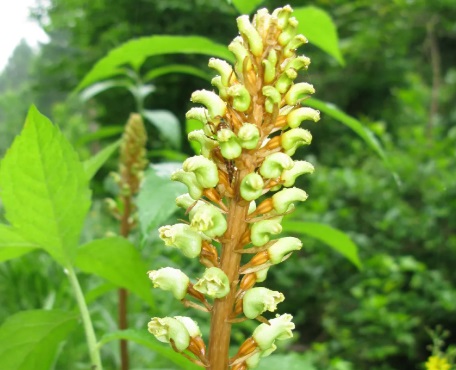Phytochemical Compound from Certain Orchids Shows Promise for Brain Health and Alzheimer's Disease
Nikhil Prasad Fact checked by:Thailand Medical News Team Mar 28, 2025 4 days, 10 hours, 48 minutes ago
Medical News: Scientists Explore GAD037 as a Potential Brain Booster
A team of researchers from Zhejiang University in China and the RIKEN Center for Sustainable Resource Science in Japan has made an exciting discovery in the fight against Alzheimer’s disease (AD). Their study focused on a compound called GAD037, a derivative of gastrodin, a natural phytochemical substance found in traditional Chinese medicine. The research shows that GAD037 has the potential to protect brain cells and promote nerve growth, offering hope for those suffering from neurodegenerative diseases.
 Phytochemical Compound from Orchids Shows Promise for Brain Health and Alzheimer Disease
Phytochemical Compound from Orchids Shows Promise for Brain Health and Alzheimer Disease
Gastrodin is a phytochemical predominantly found in the rhizomes of the orchid species Gastrodia elata, commonly known as Tian Ma in traditional Chinese medicine. Chemically, gastrodin is the glucoside of gastrodigenin (4-hydroxybenzyl alcohol), meaning it consists of a glucose molecule attached to gastrodigenin. Traditionally, Gastrodia elata has been utilized to treat ailments such as headaches, dizziness, and epilepsy. Modern research has indicated that gastrodin may possess neuroprotective properties, potentially benefiting conditions like Alzheimer's and Parkinson's diseases.
How GAD037 Works in the Brain
This
Medical News report highlights that Alzheimer’s disease is a devastating condition affecting millions worldwide. It leads to memory loss and cognitive decline due to the accumulation of harmful proteins and oxidative stress in the brain. Scientists have long been searching for compounds that can counteract these effects, and GAD037 appears to be a promising candidate.
GAD037 works by mimicking a protein called nerve growth factor (NGF), which is essential for the survival and function of nerve cells. The study found that this compound activates key brain pathways, including the PI3K/Akt and Ras/Raf/MEK/ERK signaling pathways, which are critical for brain health. By stimulating these pathways, GAD037 promotes the growth of new nerve connections and protects existing cells from damage caused by oxidative stress and harmful proteins like amyloid-beta.
Evidence from Laboratory Studies
The researchers conducted experiments using PC12 cells, a type of cell commonly used in neuroscience studies. They found that GAD037 significantly increased nerve cell survival and growth. When exposed to oxidative stress, a major factor in Alzheimer’s disease, cells treated with GAD037 showed a much higher survival rate than untreated cells.
Another key finding was that GAD037 reduced levels of harmful substances called reactive oxygen species (ROS) and malondialdehyde (MDA). These substances contribute to brain cell damage and are elevated in Alzheimer’s patients. By lowering ROS and MDA levels, GAD037 demonstrated its strong neuroprotective effects.
Additionally, the study showed that GAD037 interacts with two important proteins in brain health: insulin receptor (INSR) and alpha-actini
n-4 (ACTN4). These proteins help regulate brain cell survival and repair. Blocking these proteins reduced the beneficial effects of GAD037, confirming their role in its neuroprotective action.
Potential for Future Treatments
While these findings are promising, researchers caution that more studies are needed. So far, GAD037 has only been tested in laboratory conditions. Scientists need to determine whether it can cross the blood-brain barrier, which is crucial for its effectiveness as a drug. They also need to study its effects in living organisms to ensure its safety and efficacy.
Moreover, researchers are exploring whether GAD037 could work better when combined with other neuroprotective compounds. Some studies suggest that combining different compounds can enhance their effects, potentially leading to more effective treatments for Alzheimer’s disease.
Conclusion
The discovery of GAD037’s neuroprotective properties is an important step in the search for treatments for Alzheimer’s disease. By mimicking NGF and activating key brain pathways, GAD037 helps protect nerve cells and may slow down brain degeneration. However, further research, including animal studies and clinical trials, is needed to confirm its potential as a future treatment.
The study findings were published in the peer-reviewed journal: Antioxidants.
https://www.mdpi.com/2076-3921/14/3/344
For the latest COVID-19 News, keep on logging to Thailand
Medical News.
Read Also:
https://www.thailandmedical.news/news/essential-oil-from-dalbergia-pinnata-shows-promise-in-treating-alzheimer-s-disease
https://www.thailandmedical.news/news/revolutionary-breakthrough-daily-glucosamine-intake-reduces-dementia-and-alzheimer-s-risk-a-new-ray-of-hope
https://www.thailandmedical.news/news/galanthamine-enhances-neural-stem-cell-differentiation-and-growth-a-major-breakthrough-for-neurodegenerative-diseases
https://www.thailandmedical.news/articles/herbs-and-phytochemicals
https://www.thailandmedical.news/pages/thailand_doctors_listings
